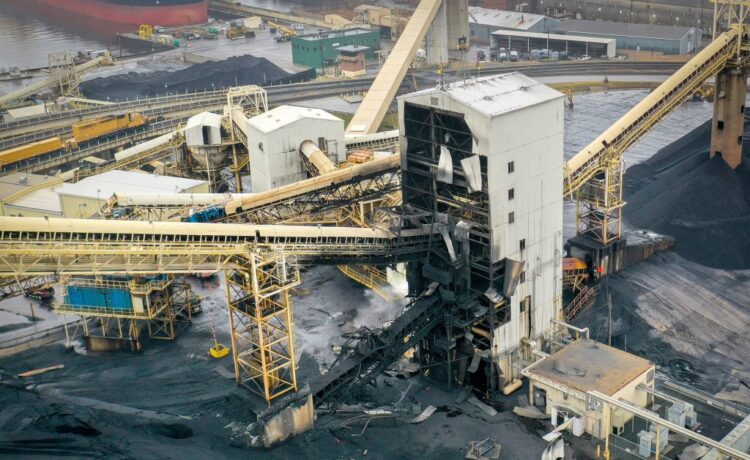Residents who were living in Baltimore’s Curtis Bay, or owned property there, at the time of the December 2021 coal terminal explosion can now apply to receive funds from a $1.75 million settlement negotiated with facility operator CSX Transportation.
They have until July 18 to file to join the class and become eligible to receive a portion of the settlement, which is awaiting final approval by a U.S. District Court judge. A hearing is scheduled for September.
The case originally was filed by two Curtis Bay residents, Cheyenne Shongo and Kennett Walker, who pointed to damages from the coal facility and the explosion, including airborne coal dust that “blanketed” the community after the blast.
Resident groups are continuing to push back against the coal terminal, where coal arrives by rail for storage and export. They are advocating for the facility to be shut down by regulators.
In a statement, the Community of Curtis Bay Association called the settlement agreement inadequate.
“Given what Curtis Bay went through with the CSX coal explosion, this settlement does not achieve justice,” read the statement. “At the same time, we couldn’t be prouder of our community for standing up and securing some relief for residents.”
David Jones, a board member of the association, said he has mixed feelings: Though the settlement is not sufficient, he plans to apply for the funds, which he would use to renovate the aging exterior of the home he purchased from his grandfather years ago.
“I really don’t want to participate, but something’s better than nothing,” he said.
CSX has faced several fines due to violations associated with the explosion, including from the Maryland Department of the Environment. The blast occurred after methane built up inside of a tunnel at the facility, and it released harmful pollutants such as nitrogen oxides, carbon monoxide and sulfur dioxide into the atmosphere, according to MDE. The company did not take “reasonable precautions” to prevent it, the agency determined.
Per a settlement with MDE, CSX owed $15,000 to the state and $100,000 to a community group, the South Baltimore Community Land Trust.
CSX also incurred a $121,000 fine from the Occupational Health and Safety Administration for worker safety violations that led up to the explosion.
In a statement, CSX spokesperson Sheriee Bowman said the explosion was an aberration.
“The CSX Curtis Bay coal pier has been operating for over 140 years without an incident like this and we remain thankful that the one-time event did not result in any injuries,” Bowman wrote.
Bowman said the company has spent $60 million to improve the coal terminal over the last 5 years, to improve dust control, worker safety and to collect all of the stormwater on facility land for reuse. She argued the facility “plays a critical role” in the energy supply chain, and in Maryland’s economy.
The facility takes in coal from Appalachia, as well as the Illinois, Colorado and Powder River Basins, Bowman said.
On Monday, community members marched through Curtis Bay to the coal terminal, and placed an “eviction notice” on its front gate, which residents signed, Jones said.
They remain concerned that coal dust blows into the community, even during normal operations.
A December report from MDE, local university researchers and community groups confirmed the presence of airborne coal dust throughout the community. MDE called it the “most advanced community-led air quality monitoring project” in the state’s history, and said the findings would factor into the facility’s upcoming new 5-year air quality permit.
Residents are still awaiting word about the new permit, Jones said.
CSX hired analysts to evaluate the study, and they found it “flawed,” arguing in part that it tested for indicators of coal dust, rather than the coal dust itself. The analysts’ report for CSX “indicates the community is in attainment with the U.S. Environmental Protection Agency National Ambient Air Quality Standards” for particulate matter, Bowman wrote.
Jones said people often ask him why the residents near the coal terminal don’t just move away. The answer is complicated. For one thing, Jones feels he would not receive a sufficient sum for his home. He argues property values have been depressed by the heavy industry surrounding the neighborhood.
But there also is the emotional aspect: Jones has lived in Curtis Bay for 35 years. He lived in the area as a child, left, and ultimately returned. His love for the neighborhood has pushed him into advocacy, working to reduce crime as well as environmental pollution, though it is an uphill battle.
“It’s heritage,” he said. “It’s generational heritage.”
Information about the settlement funds can be accessed at curtisbaysettlement.com.















